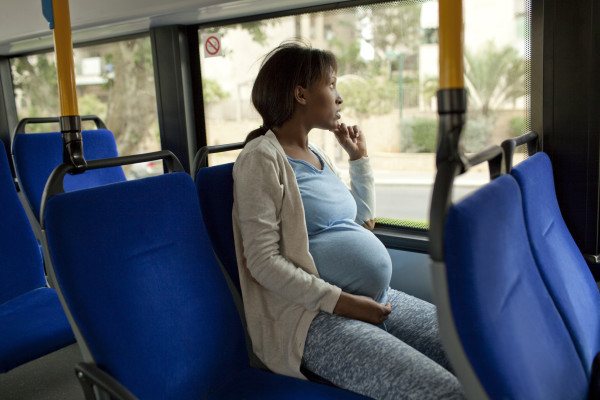Too many babies in St. louis are dying partly because their families can’t access the healthcare, good paying jobs and healthy food that mothers and their babies need to thrive. We talked with 350 St. Louis family members, and one of the biggest barriers they mentioned in having a healthy pregnancy and family is access to transportation. Below are two of the many experiences we heard:
“I was denied transportation through my insurance provider up until I was 32 weeks because I lived on a bus route. But getting to the bus stop was stressful and required traveling with kids in an unsafe environment.”
“It takes me about 3 hours just to get to work. I have to catch 3 buses or 2 buses and a train just to get to work or appointments.”
Why Transportation Matters
- Access to Healthcare: Studies show that access to transportation impacts health, because unreliable transportation leads to a lack of regular medical care and missed appointments. In our region, more than 20 percent of households don’t own a car, and over one-third of our residents do not live near a public transit stop. Every year in the U.S., 3.6 million people delay or miss appointments due to the lack of transportation.
Medicaid provides some transportation services for eligible patients, but it is difficult to schedule and restricts the number of people who can ride along – a significant barrier for a pregnant mom with young children in tow. Consumers and healthcare providers say rides are frequently late, which results in mothers missing appointments, and it’s difficult to get complaints resolved. - Access to Living-Wage Jobs: Women with higher incomes are less likely to have an infant die, studies show. But women without reliable transportation have fewer opportunities to find and keep jobs that supply a living wage. In fact, only 1 in 4 jobs in the St. Louis region are reachable by a 90-minute public transit trip.
- Access to Healthy Food: Many of the St. Louis zip codes with the highest rates of infant mortality are in neighborhoods considered food deserts by the USDA. Without affordable, reliable transportation, mothers who live in those neighborhoods can’t get to grocery stores that sell affordable, fresh and healthy food. Poor nutrition during pregnancy can lead to babies born too small.
- Stress Level: Women who experience high levels of stress during pregnancy have 25-60 percent higher risk for preterm delivery, studies show. The lack of reliable transportation compounds the stress when they endure long commutes to jobs and doctor appointments, and worry about missing appointments because of unreliable public transportation and Medicaid ride schedules.
FLOURISH St. Louis is working with family members and leaders in healthcare, education, insurance, faith and regional planning to improve transportation access for families by:
- Creating a Medicaid Riders’ Bill of Rights with fundamental standards for Managed Care plans and MO HealthNet to follow when providing transportation.
- Partnering and aligning with others to expand public transportation to connect more citizens with available jobs.
- Make it easier for everyone in the region to reach critical services, like doctors, grocery stores and child care.
We need our civic and community leaders to champion policies that improve transportation so families can get the resources they need. If you want to help in this mission, join our Transportation Action Team.

